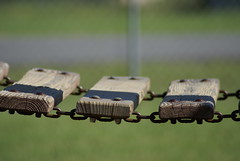
It’s been a rough spring around our house. But at the same time, it’s been better than each one before it. So I feel like I should be grateful, and I feel guilty for feeling emotionally exhausted all the time, but there you have it. I feel what I feel, and it is what it is.
I belong to some support groups for “significant others” of people with bipolar disorder, and I can tell you from years of observation and experience that, among our ranks, May is a rough, rough month. In a bit of black humor, someone somewhere began referring to this month as “May-NIA,” and that stuck. Even my own spouse, who is faithful and dedicated to his mental wellness, and takes his meds and tries to stick to healthy routines, has periods of “breakthrough” hypomania in the spring. Do what we will, the force of springtime will not be denied. Every year I’m struck with jealousy over other people’s rejoicing in the coming of spring…they’re planning their flowerbeds, washing their windows, de-winterizing their mowers, while I’m monitoring the bank account, trying to keep things quiet, and generally just scattering a fresh layer of eggshells across the floor for us to walk on. I dread spring. And to be honest, I resent having to feel that way.
In the beginning of our journey with this illness, post-diagnosis, I lived in a state of wary watchfulness. In the first year, there was a significant relapse, so after that I was pretty much in constant readiness, watching for that sign that would indicate that everything was about to go south again. If he was 5 minutes late, or didn’t answer his cell phone one time, I just knew that “it was happening again;” that he’d disappeared, he’d “run,” and that, since that was the line I drew in the sand when we decided to stick this thing out together, that our marriage would, consequently, be over. I literally went through this entire thought process on a regular basis. It was a long, long time before I could make myself continue to breathe normally in the face of even a small unknown. But I learned, as time went on, how to focus on myself, to trust myself, and to breathe.
As more time went by with no full-blown episodes, something odd happened. I did manage to stop living mentally perched on the precipice of disaster. I remembered who I was before I ever tangled with bipolar disorder. I realized that I’m smart (enough), capable (enough), and tough (enough) to handle whatever it could throw at me. And with that knowledge, I relaxed. A lot. But I didn’t anticipate what came next–what has been happening for the last couple of years.
My husband has expressed to me, often, the irony of managing a mental illness well–that is, that since he stays on top of his medication regimen, sees his doctor regularly, performs well at a regular job, etc., that people tend to “forget” that he has bipolar disorder. Then, when there is an episode of breakthrough depression or hypomania, the reaction is one of disappointment, like, “I thought you had this thing beat.” No one understands that it’s an ongoing, daily battle, and that there is no magic pill that’s going to work all the time. We “tweak” his med cocktail once or twice a year, at the very minimum.
I have caught myself falling victim to this same phenomenon, in a way, and I’m not sure it’s any better than the way I used to live. Instead of being constantly on edge, expecting things to fall apart any second, I now let even a couple of weeks of good times lull me into near-total complacency, so that, when there is a bump in the road, as there most assuredly always will be, I’m left gobsmacked, the rug pulled entirely out from under my happy little world. Every time this happens, I feel so stupid, because, of course, I knew better. But it is so altogether soul-wearying to live in that watchtower, that sometimes I just desperately want to come down for a while. To stay up there, watching, watching, watching, is to admit defeat, in a way…but more than that, that sort of life is really no life to have. It’s not just emotionally tiring; I can feel it chipping away at my physical health, with all sorts of symptoms I never knew before I met bipolar disorder, like anxiety, panic, depression, irritable bowel, nausea…this disease that I don’t even have is shortening my life.
But the alternative–life without my husband? No, that’s no life for me, either. Somewhere, somehow, there must be a way to find balance. I wish this post were more about answers.




